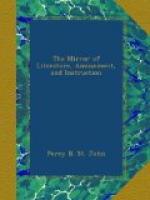COMETS AND WOMEN.
(For the Mirror.)
Comets, doubtless, answer some wise and good purpose in the creation; so do women. Comets are incomprehensible, beautiful, and eccentric; so are women. Comets shine with peculiar splendour, but at night appear most brilliant; so do women. * * * * Comets confound the most learned, when they attempt to ascertain their nature; so do women. Comets equally excite the admiration of the philosopher, and of the clod of the valley; so do women. Comets and women, therefore are closely analogous: but the nature of each being inscrutable, all that remains for us to do is, to view with admiration the one, and almost to adoration love the other.
W.N.B.
* * * * *
Dr. John Thomas, Bishop of Lincoln, was married four times. The motto, or posy, on the wedding ring, at his fourth marriage was—
“If I survive
I’ll make them five.”
* * * * *
A PRINCELY GAMBLER.
Casimir the second, King of Poland, when Prince of Sandomir, won at play all the money of one of his nobility, the loser, who, incensed at his ill-fortune, struck the prince a blow on the ear. The offender instantly fled; but being pursued and taken, he was condemned to lose his head: Casimir interposed. “I am not surprised,” said the prince, “that, not having it in his power to revenge himself on Fortune, he should attack her favourite.” He revoked the sentence, returned the nobleman his money, and declared that he alone was faulty, as he had encouraged, by his example, a pernicious practice, that might terminate in the ruin, of his people.
P.T.W.
* * * * *
EPITAPH ON CHARLES I.
So falls that stately Cedar; while it
stood
That was the onely glory of the wood;
Great Charles, thou earthly God, celestial
man,
Whose life, like others, though it were
a span;
Yet in that span, was comprehended more
Than earth hath waters, or the ocean shore;
Thy heavenly virtues, angels should rehearse,
It is a theam too high for humane verse:
Hee that would know thee right, then let
him look
Upon thy rare-incomparable book,
And read it or’e; which if he do,
Hee’l find thee King, and
Priest, and Prophet too;
And sadly see our losse, and though in
vain,
With fruitlesse wishes, call thee back
again.
Nor shall oblivion sit upon thy herse,
Though there were neither monument, nor
verse.
Thy suff’rings and thy death let
no man name;
It was thy Glorie, but the kingdom’s
shame.
(From the Eikon Basilike, printed A.D. 1648.)
C.C.
* * * * *




